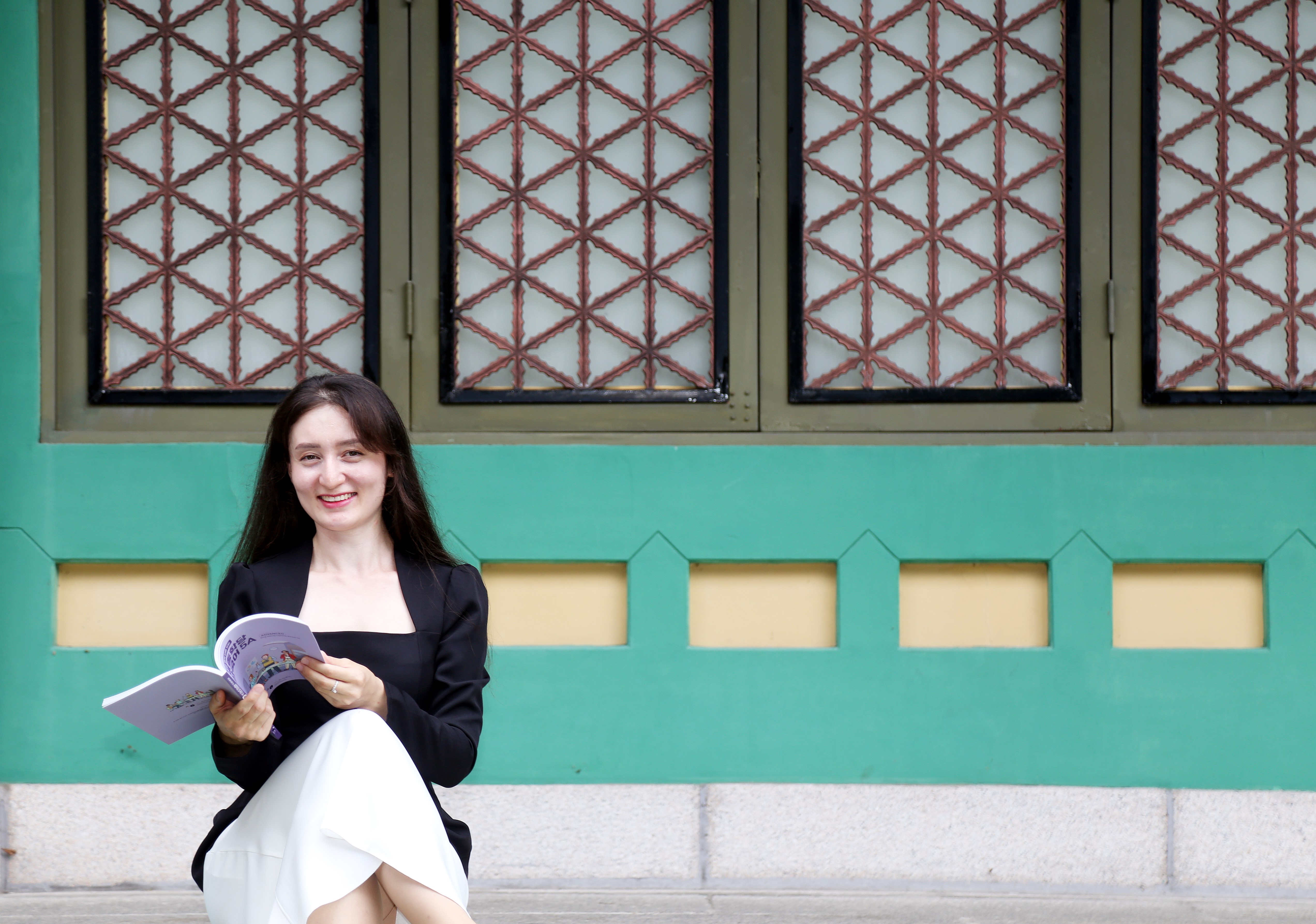
Dilbar Baimaganbetova, a Korean language teacher at the King Sejong Institute (KSI) in Kazakhstan. (KSI Foundation)
By Lee Dasom
"I think the Korean language is very beautiful, so I wanted to do something related to it. Although I came a long way, I am truly glad to have found a major that suits me very well," said Dilbar Baimaganbetova, who was selected as the most outstanding faculty member at the World Korean Educator Conference (WKEC) this year. She teaches Korean at the King Sejong Institute (KSI) in Kazakhstan.
Baimaganbetova became the first foreign national to receive a culture minister award at the WKEC. The conference was held from Aug. 6-9 at the Shilla Seoul Hotel and hosted by the Ministry of Culture, Sports and Tourism and the King Sejong Institute Foundation.
Baimaganbetova said she came a long way to become a Korean language teacher at the KSI. She enrolled at L. N. Gumilev Eurasian National University in Kazakhstan and majored in Korean studies.
People around her tried to dissuade her, saying that studying a language of a nation geographically closer to Kazakhstan would be more beneficial in getting a job after graduation. However, no one could stop Dilbar's passion for Korean.
Korea.net held a written interview with Dilbar on Sept. 9 to learn more about her journey as a student at KSI to later become the institute's most outstanding teacher.
Dilbar Baimaganbetova on Sept. 10 teaches the Korean language to students at the King Sejong Institute (KSI) in Kazakhstan. (KSI in Kazakhstan)
You became the first foreign national to be selected as the most outstanding teacher at KSI. How do you feel?
It is an honor to receive an award as big as a culture ministry award. I did not even imagine that my classes would receive such a positive evaluation. I am truly grateful.
What led you to major in Korean studies?
I first enrolled in the university's Chinese studies under the Asian studies department. Then, out of curiosity, I followed my friend who was taking free Korean language courses at the KSI in Kazakhstan. So I also enrolled in the course. I was deeply captivated by the charms of the Korean language from the first day. Thus I wanted to do something related to Korea and switched my major.
What difficulties did you have in studying Korean?
When I had changed my major to Korean studies, I realized that most other students in the department were already fluent in Korean. However, I was just beginning to learn Korean consonants and vowels back then. Apart from my major courses, I spent almost all my time studying Korean. I never slacked in studying Korean culture and Korean society in general. Thus I was able to rapidly develop my Korean skills.
Your method of teaching through games had led you to win a prize. Why did you choose such method?
Games reduce barriers in beginning a course. Also, the nature of games leads students to naturally compete with one another and actively participate.
As a foreigner who teaches Korean, what did you learn?
I felt worth and pride as I taught Korean and at the same time, I realized that speaking Korean well does not necessarily mean you can teach it well. You can teach it well only if you deeply understand Korean culture. I learned so much by listening to the speeches given by other teachers at the latest WKEC. I want to try teaching Korean culture and language through content such as short platforms.
How has the popularity of the Korean language in Kazakhstan changed?
When I enrolled in Korean studies about 10 years ago, there were only four students. In the past few years, there have been an average of at least 15 students. Also, the number of private institutes or one-on-one courses on the Korean language have conspicuously risen.
What about Korea are KSI students particularly interested in?
Most definitely K-pop and Korean TV dramas. When I begin my new courses, I ask students why they are learning Korean, and almost all of them say "K-pop" or "Korean dramas." So I prepare my courses by using Korean content that suit these students' interests.
Any advice that you would like to give to Korea.net readers learning Korean?
The most efficient way to learn a foreign language is to directly live in the society that uses the language. However, for those who cannot do that, I want to tell them to make an environment in which they can speak Korean. Visit places frequented by Koreans or try working in places that have Korean staff members. There needs to be Korean language in something related to your daily life. Setting your cell phone or laptops to Korean is also a good way.
dlektha0319@korea.kr